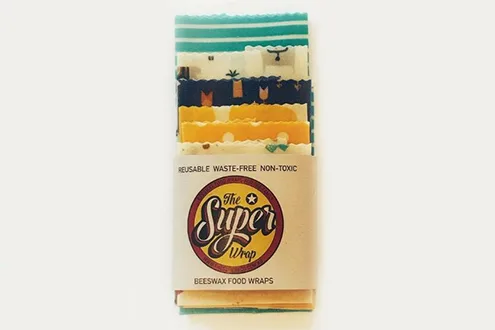
Beeswax wraps
Etsy
The BBQ is on, your annual leave is all filed away and the festive season is well and truly upon you. It's time to kick back and relax and hopefully put off all your stress until the new year.
Unfortunately, Christmas isn't exactly a stress-free time, and it can become even more stressful when you stop and consider just how much waste and excess the holiday inspires. Consider the following stats:
So, here are some are simple ways that you can enjoy the festive season and also be green.

1. Choose reusable decorations. Things like cheap tinsel and other short-lived decorations are likely to end up in landfill once the season's over. Buy good-quality decorations that will last for ages, and ones you won't mind hanging on your tree year after year.
2. Use nature to decorate. With a little bit of artistic flair and maybe some paint, things like pine cones can make very cute decorations. Try getting creative with recycled materials like wrapping paper to design your own handmade decorations.
3. Get a real tree (or a secondhand one). While chopping down a living tree may seem pretty harmful to nature, most are actually sustainably planted for that purpose. Another option is to get a living tree in a pot and decorate it for years to come. But if you do choose a fake tree, try op-shops or online marketplaces first, and take care of it so it can be used again and again.
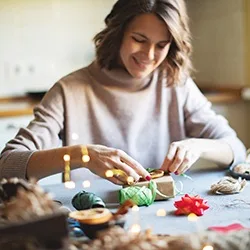
4. Avoid throwaway gifts. Make sure you're giving people gifts they'll actually use, rather than gifting them something unwanted out of obligation. If you're taking part in an office Kris Kringle or Secret Santa and don't know what to get, things like chocolate, tea and reusable coffee cups usually have wide appeal.
5. Shop local. This can lower the environmental footprint of the gifts you give because they don't need to be imported or shipped from somewhere else. It also helps support small businesses that have taken a hit during the pandemic and cost of living crisis.
6. Gift an experience or charitable donation. Instead of something physical that can be thrown away, consider a concert ticket, subscription or a gift card for experiences. You could even donate to a charity or sponsor an animal on your recipient's behalf.
7. Source ethical products. Very cheap commercial goods usually involve exploitation somewhere along the chain. A $5 cotton shirt is often the end result of low wages, poor working conditions or environmental harm. Invest in fair-trade items and ethical gifts whenever you can.
8. Make your own gift. Sure, it might not be perfect, but many people will appreciate something that you've made for them more than something store-bought.
9. Pass it on. If you're getting a new electronic device and your old one still works, consider gifting it to somebody you know who might benefit from it. Or, if you've been given a perfectly good gift that you don't want, consider re-gifting it – this can be controversial for some people but it can help keep items out of landfill. And you can always donate it to an op-shop or through a gifting group online if there's no one you want to give it to.
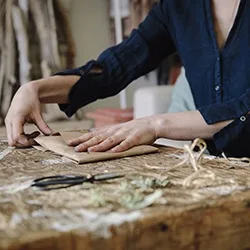
10. Recycle. Try and use old wrapping paper that you have lying around from last year. Or use lower-impact brown paper or decorate some butcher's paper instead. Fabric gift wrap has also become more common in recent years, with stores like Typo and Cotton On often stocking it at this time of year.
11. Try some unconventional wrapping. There are tons of things that you can use for wrapping that don't need to be thrown away afterwards. Try scarves, fabric bags or tablecloths, or put the gift in a reusable box, bag or tin.
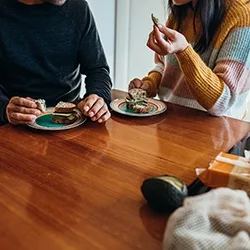
12. Buy what you need (but don't go overboard). Think about how much you realistically will eat to avoid going overboard. If you're never going to finish 5kg of prawns before the new year, order a smaller amount – or give some to family and friends who will use them.
13. Look at plant-based options. There is a lot of research that shows plant-based diets have benefits for both the planet and people. In fact, the UN's Intergovernmental Panel on Climate Change has reported that emphasis on plant-based diets (along with sustainably-sourced meat) "present major opportunities" for reducing the impact of climate change. By 2050, this could help reduce yearly carbon emissions by up to 8 billion tonnes.
While you don't have to cut out meat completely, there is an abundance of fruit and veg that's in-season in Australia over Christmas. You can roast it, make salads, serve it with (dairy-free) ice cream – there are all kinds of options with fresh food, not to mention nuts and legumes (just check for allergies with these). You can check out blogs, search Instagram for inspiration – you could even gift someone with a vegetarian/vegan cookbook if you think it'll take their fancy.
14. Cooking and storage solutions. Cling wrap is easy to overuse for everything, but there are friendlier alternatives. Consider using parchment/baking paper, beeswax wrap or reusable containers instead. Or opt for aluminium foil, which you can often put in the recycling bin if you roll it into a ball (the City of Sydney website says to make it the size of a tennis ball).
15. Drop the disposables. Plastic utensils, napkins and disposable plates all add up. Try and use the real thing where possible and consider washable cloths instead of napkins.

16. Solar lights. Outdoor lights (and Christmas tree lights, for that matter) may look pretty, but they drink up electricity. Invest in a string or two of solar lights and enjoy their free, renewable glow.
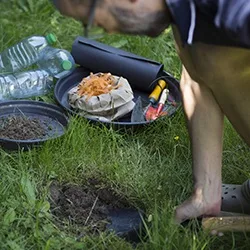
17. Food. If, despite your best efforts, you end up with too much leftover food to eat after Christmas, there are plenty of great recipes online. You can often freeze food as well. Or, consider investing in a worm farm or compost so you can dispose of the food scraps in an environmentally-friendly fashion.
18. Presents. If you have unwanted or ungiven gifts, try and see whether you can return them to the store or give them to someone else who might be able to use them. Australian stores must accept returns of gifts that don't function in the way that you would expect them to or are of poor quality, regardless of their "no refunds" signs.
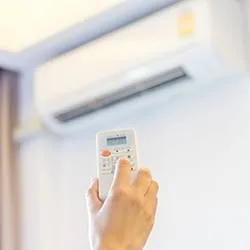
19. Drop the air-con. Lowering your thermostat even a few degrees can make a huge difference in how much energy you consume. Saving power helps save the environment, especially considering how reliant Australia is on fossil fuels.
20. Stay eco-minded at the beach. Even when you're out and about, you can make a difference. Pick up any trash you might see, avoid disposable plates and utensils, use reef-safe sunscreen and don't feed the birds. They're fine just as they are.
21. Fix it up. Rather than throwing away stuff that breaks, see if it can easily or reasonably be repaired. Fixing something not only saves it from the dump, but it stops you from having to spend money on a new one to replace it.
Picture: GettyImages
The Finder Green Report found environmental concern has decreased slightly over the past year, largely due to greenwashing and the cost of living crisis.
How concerned are Australians about their personal carbon footprint?
Interviews with companies, organisations and initiatives that are helping create a greener planet.